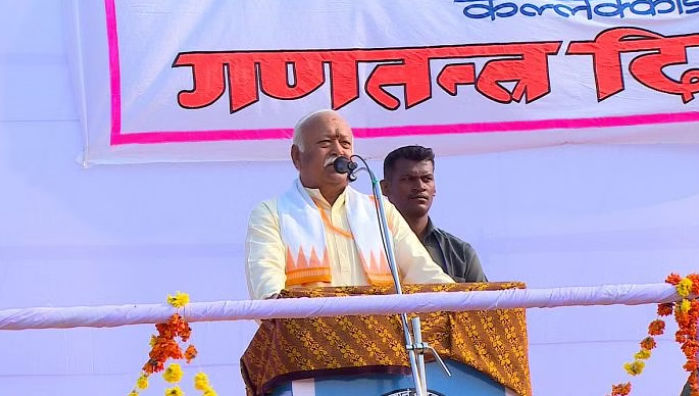RSS: A Non-Political Organization (GS Paper 2, Social Reforms)

Introduction
- The Rashtriya Swayamsevak Sangh (RSS), a prominent Hindu nationalist organization in India, has recently come into the spotlight following the Indian government's decision to lift a longstanding ban on public servants participating in its activities.
- This move, facilitated by the Department of Personnel and Training (DoPT), removes the RSS from the list of organizations deemed "political," thus allowing central government employees to engage with it without fear of penalty.
Why in News?
- The recent directive by the DoPT, issued on July 9, 2024, rescinds references to the RSS in official memorandums from 1966, 1970, and 1980.
- This decision is specific to central government employees, while state governments retain their own Conduct Rules and can issue relevant instructions as they deem fit.
- Notably, the Jamaat-e-Islami remains classified as a political organization, prohibiting government officials from participating in its activities.
Historical Context and Official Memorandums
Official Memorandums of 1966, 1970, and 1980:
- 1966: The Ministry of Home Affairs (MHA) issued a circular on November 30, 1966, clarifying that participation in RSS and Jamaat-e-Islami was against government policy. This was linked to Rule 5 of the Central Civil Services (Conduct) Rules, 1964, which prohibits government servants from political involvement. Disciplinary action was recommended for violators.
- 1970: A reiteration of the 1966 instructions was issued on July 25, 1970, stressing disciplinary measures for government employees associating with the RSS or Jamaat-e-Islami.
- 1980: A directive from October 28, 1980, emphasized the importance of maintaining a secular outlook among government employees and warned against communal biases.
Conduct Rules Pre-1966:
- Before 1966, the Government Servants’ Conduct Rules of 1949, particularly Rule 23, already prohibited participation in political activities.
- This was echoed in Rule 5 of the Central Civil Services (Conduct) Rules, 1964, and the All India Services (Conduct) Rules, 1968.
Penalties for Violations:
- Violating these rules can lead to severe consequences, including dismissal from service.
- The government's decision is final in determining whether an organization is political or an activity violates the rules.
About Rashtriya Swayamsevak Sangh (RSS)
Foundation and Ideology:
- The RSS was founded in 1925 in Nagpur by Dr. K.B. Hedgewar.
- It aims to promote Hindutva, emphasizing Hindu cultural and national identity.
- The central ideology, articulated by Vinayak Damodar Savarkar, posits India as fundamentally a Hindu nation, focusing on uniting people under a common national identity.
Pre-Independence and Post-Independence Activities:
- Pre-Independence: The RSS played a significant role in mobilizing Hindu society, focusing on community service, education, and promoting Hindu values.
- Post-Independence: After 1947, the RSS faced scrutiny, especially after Mahatma Gandhi's assassination in 1948. It was briefly banned but reinstated after pledging loyalty to the Constitution.
Structure and Influence:
- The RSS operates through a network of shakhas (branches) across India and abroad, focusing on physical, intellectual, and cultural training.
- It has inspired organizations like the Vishva Hindu Parishad (VHP), Bajrang Dal, and Akhil Bharatiya Vidyarthi Parishad (ABVP).
- The RSS is also considered the ideological parent of the Bharatiya Janata Party (BJP).
History of Bans on RSS
- 1948: Banned after Gandhi's assassination; lifted in 1949 after pledging loyalty to the Constitution.
- 1966: Government employees banned from joining RSS, reiterated in 1970 and 1980.
- 1975-1977: Banned during Indira Gandhi's Emergency; lifted in 1977.
- 1992: Banned post-Babri Masjid demolition; lifted in 1993 after a commission deemed the ban unjustified.
Jamaat-e-Islami and Ananda Marg
Jamaat-e-Islami:
- Founded in 1941 by Abul A'la Maududi, it aims to promote Islamic values and implement Sharia law in governance.
- The organization was banned in Jammu and Kashmir in March 2019 under the Unlawful Activities (Prevention) Act (UAPA).
Ananda Marg:
- Founded by Prabhat Ranjan Sarkar in 1955, it is known for the Progressive Utilisation Theory (Prout), promoting welfare and development in all aspects of life.
- It gained notoriety in the 1960s, leading to conflicts with the West Bengal government and was banned during the Emergency (1975-1977).
Conclusion
- The decision to lift the ban on RSS activities for central government employees marks a significant shift in the Indian government's stance towards the organization.
- By redefining the RSS as a non-political entity, the government has opened the door for public servants to participate in its activities without fear of retribution.
- This move reflects broader socio-political dynamics in India and underscores the evolving nature of governance and civil service regulations in the country.


